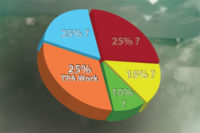Are You Running a Restoration Business or Just a Job?

I’ve found there are basic functions that need to be regularly and continuously accomplished to be able to run a business. The three functions needed to run a successful business are:
- The entrepreneur needs the availability of technical skills to do the work that people want done.
- The entrepreneur needs the desire and the passion to run a business.
- The entrepreneur needs the business skills to keep a business operating.
When a business is started, it is assumed by the owner-operator that it will be successful in that, as an owner, they will make more money than they have previously earned as an employee. Most entrepreneurs haven’t thought about whether or not they want to run a business for profit or run a business that is not for profit. It’s confusing, because both types of businesses need to make a profit. The difference is that they operate under different tax rules.
I’ve watched as ex-employees start their own business and struggle with it. Some do not understand why they are working harder now than they did as someone’s employee, why they are working longer hours than they did as an employee, and why they are making less money than they did as an employee. What they finally realize is that a business takes more than the 40 hours a week they put in when they worked for someone else.

A business is an entity that agrees to take a want, need or desire from a source and, for a fee, fulfills the request. Think of a pipe with a fixed diameter as an example of the environment in which a business operates (Image 1). The business chooses the diameter of the pipe based on the types of jobs that the business decides that it wants to do. The premise being that if the job fits inside of the pipe, it is the type of job that fits the company’s abilities. It then makes it much easier for the business to see whether or not the job fits the company. If the job does not fit inside the pipe, the business knows that it is not the type of job that they have decided they want to do. So with the premise set for the business and the types of jobs they are going to do, let’s go to the functions.
The new entrepreneur needs the availability of technical skills to do the work that people want done. The majority of people come into their new business with the ability to perform the work they want their business to offer, usually from working as an employee in the same industry. They usually have become very proficient at their job, and usually they are feeling they can do it faster and better than people around them. They are also feeling that the money being charged for their services could be charged by them, not their boss, and that would allow them to make more money than they are earning as an employee.
A minority of people starting a business lack the necessary technical skills to complete the needed work. As a result, they have to hire individuals to do part or all of the needed work. They are at a greater disadvantage in the new business due to needing more cash to start the business with. The individual that can do the technical work has the advantage over one that cannot do the work. By being able to do the work themselves, they are always guaranteed a job as long as there is work to be done.
The drawback to this edge is that they can get too involved in the work and therefore not pay attention to the rest of the functions that need to occur in a business. Said another way, the skilled person is sometimes overly confident in their abilities and as a result, do not pay attention to other things that need to be done. The non-skilled person will be paying more attention to the situation and what is going on, because they know that they do not know as much as they need to know technically.
The entrepreneur needs the desire and the passion to run a business. For you who have started your own business, remember the wonderful feeling of pride you had when you opened your doors? It is a very powerful feeling, and there is nothing like it.
Have you begun to notice that it is not as much fun as it use to be to own your own business? Remember how you use to spend hours talking and dreaming about how you thought it was going to go? Remember how great you felt when you bought a piece of equipment? Remember the pride you felt when you and your business were recognized as being a part of your local community? As you’ve noticed, those feelings begin to decrease as the business gets older and becomes more difficult to run. Like it or not, people around you can feel the desire and passion you carry around for your business. They want to be around a winner, they want to be a part of a company that is going places. They really want to know what is in it for them and they like to receive rewards for their hard efforts, just the way you used to feel! It’s like a hometown team losing to a non-local team; you can feel, see and hear the disappointment and the loss of pride in the local hometown loss. The entrepreneur started with that great feeling and they need to perpetuate that feeling in order for the company to move ahead.

A small business is defined by the IRS as doing a volume of under $100 million. The U.S. Government says that 80 percent of the economy is made up of small businesses. Rutgers University did a survey a few years back and determined that 65 percent of all businesses failed within their first five years of operation. When businesses fail, it’s usually not because of lack of business; they fail because they run out of cash. Most businesses learn what they need to know by reacting to opportunities that occur as they are trying to grow their business. Let’s face it: starting out, everyone believes they will be in the 35 percent that succeeds. Unfortunately, many believe it without benefit of actual understanding of how to succeed. The other piece of the puzzle is, the 65 percent that fail do not come back and tell the 35 percent why they failed. A lot of entrepreneurs believe they can smell failure, and they run away from anyone in whom they sense it.
Formal education is a possibility for some, but certainly not all, people who want to go into business. A lot of entrepreneurs believe the only way they can learn to run their business is through real-life experience. A good place to get help is to do what you are currently doing, i.e., reading trade magazines, attending trade shows, and sharing experiences with non-competitors in the same business.
So which do you want to run, a business or a job? I know, it’s difficult to decide, but consider looking in a mirror and asking yourself:
- Do you have the availability of technical skills to do the work that people want done?
- Do you have the desire and the passion to operate a business?
- Do you have the business skills necessary to keep a business operating?
If you’re still up in the air about it, feel free to contact me, and let’s talk about your best fit for your career and your life.
Looking for a reprint of this article?
From high-res PDFs to custom plaques, order your copy today!




